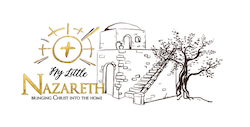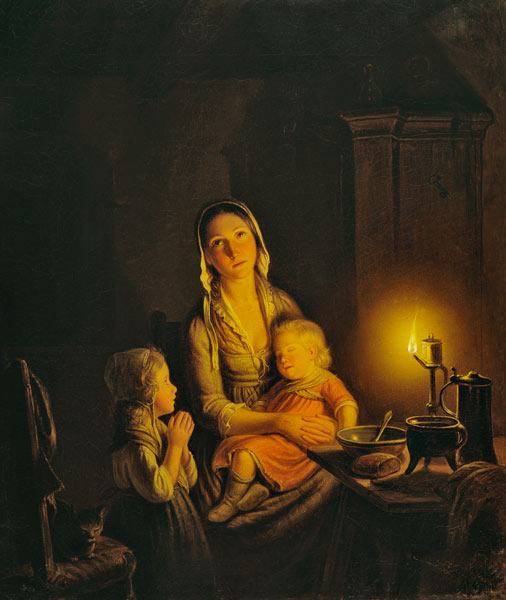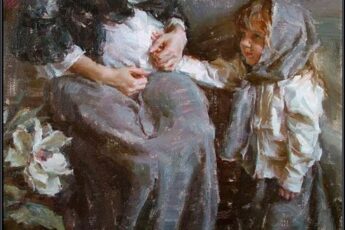We have been trying to make our Sundays more set-apart. More family-oriented and God-centered. Besides going to Mass first thing in the morning, we have been trying to be obedient to the call to make Sundays not worldly and, instead, full of holy family traditions and prayer. We always make a nice brunch after Mass and then have a formal meal in the evening. But for lent we wanted to start implementing something really special.
We decided to give up much of our technology. Besides some items that we found especially necessary, like our heater, refrigerator, stove, toilet, running water (you get the idea), we decided to forgo new technological inventions. Our phones, TV, Alexa, lights didn’t make the cut.
No to Technology
The world has changed so dramatically over the past 100 years due to technology. As studies and documentaries come out about the harmful effects on our minds due to “too much technology,” we mothers are charged with the responsibility of recognizing the harmful effects that technology can have on the souls of those in our household.
As Alice von Hildebrand stated in her article, Murder of Culture, the progressive technology that we have today can easily lead to a pride.
The power that technology now gives man, however, threatens to nourish in him the poisonous and deadly illusion that—given time—there is nothing, absolutely nothing, that he will not be able to control: the weather, sickness, and even death. Unlimited “progress” lies in front of him, one day he will become god without God. That was the promise that Satan gave to our first parents. “You will be like God.”
This constant progress has affected us–in so many more ways than we can even fathom, I’m sure. Always being able to know, to buy, to progress impacts our bodies, minds, and souls.
Yes to Real Culture
We mothers must always be asking ourselves if what we are allowing to come into our home, whether it be through a video, song, people we associate with, or even habits that are being formed, are truly benefiting our home culture.
Alice von Hildebrand goes on in her article to state an essential aspect of culture to keep in mind:
For authentic culture is the fruit of wisdom, that is a philosophy of life based on truth. It aims not at improving man’s daily life, but at feeding his spirit, by knighting daily life with beauty. For man cannot live on bread alone. His soul longs for spiritual food that visual objects and noble sounds can give him. Through their sheer beauty, they point to a world which, being perfect, will no longer need tools for inventions, but will be an eternal contemplation of Perfect Beauty, that is God.
We can so easily see a perversion of culture, or rather what she calls anti-culture, in our current situation. Many of us have chosen to homeschool specifically because of the obvious anti-culture in the public school system. Instead we choose to build a little world in our homes, a real culture, that leads our little ones to Truth.
Learning from the Past
I have always loved to learn about my ancestors (ask my dad–I can’t get enough of it!). Thinking that not long ago our great-grandparents lived so dramatically different than us fascinates me. My husband and I have passed this love onto our children this lent through reading The Little House series. Every evening we light candles and turn on battery-powered votive lights in little ceramic houses while the kids cuddle up to listen to daddy read. I think it’s one of my favorite activities I’ve ever done in my life.
I feel it creating a beautiful culture in our home. I feel our children soaking up the marvelous attraction to simplicity and humility. The wonder of daily life, little stories of the past, the sweetness of recognizing virtue and vice in the character’s life, all makes my mama heart so happy and contented.
They didn’t know what the weather would be like the next day. They didn’t know if they would get honey this year or when they would have fresh meat again. The girls relished simple pleasures and learned what being feminine really looked like–how the feminine gifts were irreplaceable and the masculine, as well. The family worked together, creating a culture that was to help them meet their physical and spiritual needs.
The Highest Thing
At the end of her article, Alice on Hildebrand quoted Chesterton:
Chesterton put it best: “There we have in full operation that strange religious dogma which crept into the minds of so many evolutionists— the notion that the last thing must be the highest.”
This “last thing” of our age, our technological advances, are not the be-all, end-all. I love the light of a candle. I love the feel of kneading dough in my hands. I love looking into the eyes of the one I’m speaking with and giving them a nice squeeze. I love sewing my own little creations and producing my own food. I receive such joy and a spirit of true gratitude. Recognizing these little things, the highest things, cannot be ignored, but rather, cherished in our homes.
I encourage you to try to spend your Sunday without technology–a Sunday by candlelight. Allow your heart to be brought up to the highest things–relationships, God, the unknowing of the moments that help us rely on our Creator.
No, we are not God. Our God is much more beautiful than we are. Let us rest in Him.








